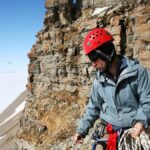Different backgrounds, common passion
While these five data specialists come from very different backgrounds, all have several things in common.
First, they enjoy being able to use their own skills and talents to do work that has an immediate and lasting impact on their organizations and beyond. Next, they tend to work in interdisciplinary teams, and frequently communicate with colleagues from different disciplines. Third, they are curious about the world around them, and have continued to learn new skills both on and off the job.
Transitioning from academia
Like any career transition, moving from academia into a non-academic career is a learning experience, but not a difficult one.
Dr. Monica Granados, a campaign manager at Creative Commons, stresses that a research-based education, particularly one with a quantitative component, is excellent preparation for a variety of jobs outside of academia. She secured data-heavy policy roles with Environment and Climate Change Canada thanks to her skills in data analysis, writing, and communication.
Data scientist at IBM, Dr. Stephen Mitchell’s reflections were similar: as his research in academia was primarily modeling and machine learning work, the transition into data science was reasonably smooth (although he cautions that there is a lot of new information to absorb in the first year or so on the job).
Academic programs also develop useful soft skills. For example, Dr. Anna Pastwa works in the banking industry and applies her expertise in artificial intelligence to detect financial fraud. Her job requires her to make presentations, interact with stakeholders, manage projects, and mentor junior colleagues—all skills in which she was well trained as a social scientist.
The tools of the trade and where to get them
In addition to the skills commonly learned in most quantitative research degrees, individuals seeking to enter data science careers need strong programming skills. Among the data scientists profiled above, the most cited programming languages were SQL (structured query language), used for accessing and manipulating databases, and Python, a powerful, open-source programming language. They also mentioned programming skills in R, Matlab, and SAS, as well as proficiency in machine learning and Google Cloud.
There are options when it comes to training in data science. Gary Wong, statistician and analyst at GreenFirst Forest Products, credits specific university degree programs for his training. Drs. Granados and Mitchell attended short-term “intro to data science” programs (e.g., Insight Data Science Fellowship).
Other ways to gain the specialized data science skills required by employers, suggested by Dr. Mitchell, include bootcamp-type programs offered by organizations (e.g., Data Incubator); courses offered by universities (e.g., UC Santa Barbara’s National Center for Ecological Analysis and Synthesis); and self or online study (e.g., Coursera).
Many data, many opportunities
Marketing, fraud detection, public policy, tech consulting, and marine conservation: these are only five of countless possible data-related careers. To conclude, the last words go to Jonathan Pye, Director of Data Operations at the Ocean Tracking Network. He eloquently describes the opportunities:
“Every industry or field has experienced or will experience a data collection revolution, where the volume of information surrounding your decision-making is outpacing the traditional ways of making those decisions. Therefore, there will always be plenty of interesting work to do to help organizations drink from the firehose of their own collected digital knowledge and come to prescriptive, or profitable, or innovative conclusions. If you are the kind of person who loves to immerse themselves in a new environment and dig deeply into all of its problems, data science is the shingle you want to hang up.”




